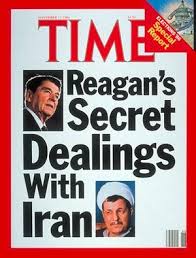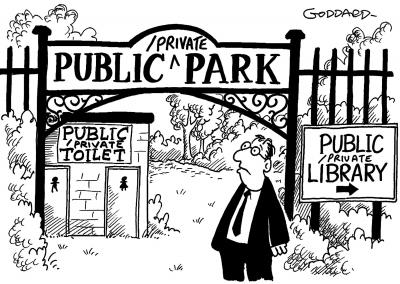 This is the fifth entry in a month-long series, Fifty years in the United States: An immigrant’s perspective, as part of the annual Blogging from A to Z Challenge.
This is the fifth entry in a month-long series, Fifty years in the United States: An immigrant’s perspective, as part of the annual Blogging from A to Z Challenge.
The Eighties.
We human beings like to find ways to order and keep track of the passage of time, as if by packaging and labeling it we can convince ourselves that we are in control of it. So it is when we carve time into decades and then slap a label on each one, a label that is almost inariably a gross oversimplification. But in the United States the Eighties are an exception to this rule; they are known as the Reagan Years, referring to the two-term presidency of Ronald Reagan (1981-1989), and Reagan’s policies really did not only span the decade but came to define it. Andrew and I lived a thrifty life throughout the Eighties, working very hard and making very little, but since we were largely removed from the mainstream economy, Reaganomics, as it was called then, or neoliberalism, as it came to be known, didn’t do the damage to our lives that it did to so many others.
Reaganomics, simply defined, was “the set of economic ideas followed by Ronald Reagan when he was US President in the 1980s, [which] included lower taxes and spending on public services, and less government control of the economy.” Here’s a short video that states in a fairly balanced way why Reaganomics was so controversial, and here’s a longer article, Reagan’s Real Legacy, that doesn’t mince words about its devastating long-term damage. Back in 2011, the centenary of his birth, those of us who remembered the terrible Reagan years were outraged by the way politicians of all stripes were trying to outdo each other with praise for him; the man was practically being canonized. It’s important to set the record straight–and don’t worry, I’m not going to do so here except to highlight a couple of features of the Reagan era that bear remembering.
This was the era of the so-called War on Drugs, when heroin and crack cocaine trafficking and addiction ravaged the cities and destroyed the lives of millions of African Americans in particular. In this war, as War on Drugs–or War on Blacks? argues, black people were seen as the enemy, not the victims, and as Reaganomics cut social programs, including funding for public education, it ramped up policing and incarceration, targeting and prosecuting blacks disproportionately, and slamming them with heavier sentences.
 As if that wasn’t bad enough, there is a preponderance of evidence showing that a drug trafficking cartel that was operating in Los Angeles in the 1980s was funneling its profits to the contras in Central America–the U.S. funded mercenaries whose mission it was to overthrow the leftist Sandinista government in Nicaragua. Reagan’s administration was heavily involved with funding, training, and arming the contras, just how heavily they were doing so came out in the Iran-Contra Affairs, leading to a long-running Congressional investigation in which National Security Council staff member Lieutenant-Colonel Oliver (Ollie) North, the White House official most directly involved in secretly aiding the contras, selling arms to Iran, and diverting Iran arms sales proceeds to the contras, testified–and lied repeatedly under oath–to the joint congressional committee.
As if that wasn’t bad enough, there is a preponderance of evidence showing that a drug trafficking cartel that was operating in Los Angeles in the 1980s was funneling its profits to the contras in Central America–the U.S. funded mercenaries whose mission it was to overthrow the leftist Sandinista government in Nicaragua. Reagan’s administration was heavily involved with funding, training, and arming the contras, just how heavily they were doing so came out in the Iran-Contra Affairs, leading to a long-running Congressional investigation in which National Security Council staff member Lieutenant-Colonel Oliver (Ollie) North, the White House official most directly involved in secretly aiding the contras, selling arms to Iran, and diverting Iran arms sales proceeds to the contras, testified–and lied repeatedly under oath–to the joint congressional committee.
Funnily enough, during the 1980s, this era of privatization when public-sector entities were sold off to private companies, when unions were systematically smashed, when social security was slashed and welfare and other programs cut right back, privatization was happening on a personal level in my own life. This was the decade when Andrew and I started our own small job printing business, first as a partnership with his sister Eve, and then as a sole proprietorship. It was the decade in which we were married, after which I took Andrew back with me to India in my first return visit since I had left in 1968. Also during this time we moved out of the Boston area with three friends to a hardscrabble farm in the arctic corridor of North-Central Massachusetts, where our son Nikhil was born and where we lived until 1990, just before he was due to start kindergarten. During that time we cultivated a large home garden, canned our own food, made our own maple syrup, watched hundreds of VHS movies on those long winter nights, changed a whole lot of cloth diapers, and shoveled a whole lot of snow. I became a householder and a mother, in some of the happiest and most all-absorbing years of my life. Later in the decade, I began a course of graduate study and, almost accidentally, found myself on an entirely new trajectory. I will write about some of the highlights of these years–my Eighties–in the next few entries.
Tell Me Another (Contents to Date)
Chronological Table of Contents



Good summary of the Reagan years. The country still hasn’t recovered from that time.
LikeLiked by 1 person
Ah! The eighties! It was a time of child raising for me too, with one born in 1980 and the other in 1982. Although I tried to go back to work in 1981 I decided I was missing too much and everything was chaos so spent the decade as a home maker with enough casual work to keep the wolf from the door. I certainly saw Reagan on the news and realised his view of politics varied considerably from mine. From 1983 to 1990 we had as our Prime Minister Bob Hawke who was arguably one of our greatest Prime Ministers (depends which side you are on). Surprisingly he was good friends with Reagan even though they were on opposite sides of the political fence.
LikeLiked by 1 person